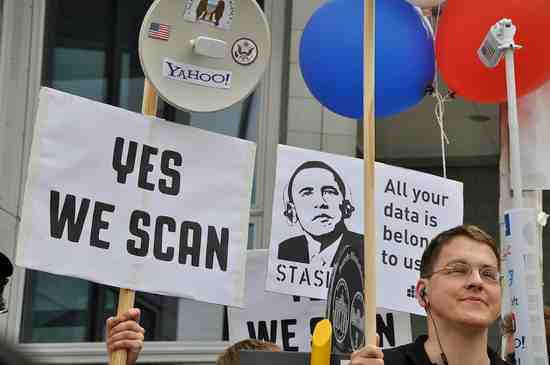Get over it!
Not withstanding the anger of millions of Americans over large-scale government spying, there will not be any change.
Not one whit.
Because the beneficiaries from the spying operations will not allow change.
Helpless Americans
America’s intelligence operations have been outsourced to private entities like Booz Allen and several hundred other companies.
Whether it’s a Democratic administration or a Republican President, the status quo will continue unimpeded.
 (Picture courtesy: Digitale Gesellschaft)
(Picture courtesy: Digitale Gesellschaft)
Having tasted blood (private corporations feast on $56 billion a year in intelligence contracts), these giant private contractors will never allow surveillance operations on Americans and foreigners to be scaled back.
Just like the gun lobby will never allow even the smallest change no matter the repeated incidents of shooting.
Americans can shout, scream, fret, fume, rage and rant but they’re impotent, powerless to change the current kakistocracy that is overseen by corporate overlords.
Today, 70% of U.S. government spending on intelligence is distributed to hundreds of private contractors.
As Tim Shorrock wrote in the New York Times yesterday:
Seventy percent of America’s intelligence budget now flows to private contractors. Going by this year’s estimated budget of about $80 billion, that makes private intelligence a $56 billion-a-year industry.
[T]here’s the revolving door — or what President Dwight D. Eisenhower called “undue influence.” With few regulations and no questions being asked on Capitol Hill, hundreds of former top N.S.A. and C.I.A. officials have migrated from government to the private sector and back again. The poster boy is Michael McConnell, who served as N.S.A. director during Bill Clinton’s first term, then went to Booz Allen for a 10-year stint, became director of national intelligence for George W. Bush from 2007 to 2009, and is back at Booz Allen today.
We have no way of knowing how people like Mr. McConnell formed their business relationships, and what agreements or compromises they might have made to get their private-sector jobs (and vice versa). They may be honorable men, but as recent history has shown us, there’s no reason to take them at their word. And the current one-year ban on lobbying for former officials does little to prevent conflicts of interest.
Obama’s Fall
Yes, We Can.
Yes, We Scan.
Abandoning his election-winning rhetoric of “We Can” and “Hope,” U.S. President Barack Obama has adopted a new mantra – We Scan – that symbolizes the depths of his fall.
The above picture held aloft by German protesters today accurately sums up Obama’s genuflection before his corporate masters who pull the strings behind the scenes and insist that the actions of all Americans must be scanned and monitored 24×7 by the National Security Agency (NSA), Federal Bureau of Investigations (FBI) and a host of other government organizations and private corporations.
Loss of trust by Americans in their leaders and government is now complete.

“Yes, we scan” Good one, I am sure SNL will pick this up
SearchIndia.com Responds:
I should start watching SNL on a regular basis.
Why am I paying Hulu Plus?
My guess is Obama did not initiate this, its been going on for a long time.
Some security experts probably told him that this is necessary and to keep it hush hush.
Like most politicians I am guessing he decided it’s not good to rock the security boat too much because if some bad thing happens public and the opposition in this case security psychos GOP will blame him for screwing up.
Well what’s a good democrat President do under these circumstances?
SearchIndia.com Responds:
You write: Well what’s a good democrat President do under these circumstances?
The distinction between Democrats & ReThuglicans is merely semantic!
Indian government is doing the same – http://in.reuters.com/article/2013/06/20/india-surveillance-idINDEE95J04V20130620
There was an interesting take by someone from MIT on NPR the other day, which I thought was interesting.
The issue was about the monetary value for data. The suggestion was to make data a commodity. So if the NSA wanted to get phone data from Verizon, they pay $$ to get it. If my records were part of that sale, I get a some percentage of it because I am the owner of data about me. I like it.
I wish this model could be extended for commercial data providers as well, marketeers spend a pretty penny buying data. Data providers are making money off the cookies sitting in my computer, why can’t I get a cut ?
Also, why would the NSA be any different from any other data buyer ?
I guess in this model, if you see a lot of $$ inflows one could suspect that the NSA is very interested in them.
SearchIndia.com Responds:
1. You write: Data providers are making money off the cookies sitting in my computer, why can’t I get a cut ?
Users refuse to pay for news, refuse to pay for 99-cent apps in the AppStore, refuse to pay for e-books, refuse to pay for e-mail, refuse to pay for social networking, refuse to pay for music…..so what’s the provider gonna do to make money (btw, advertising on the web is not a big revenue-generator…google is an exception)?
He’s gonna peddle your data to all and sundry! Nothing surprising about it.
Expecting something for nothing is the core of the problem.
I’ve even developed a SI theory for this irrational phenomenon – In the Internet economy, a service is valuable only as long as it’s ‘free.’ For instance, when Rupert Murdoch put up a paywall for the London Times, traffic fell 90% – http://www.guardian.co.uk/media/2010/jul/20/times-paywall-readership
2. As I’ve said in the piece, the mega corporations have tasted blood on the intelligence gathering and snooping operations and they definitely ain’t gonna give up this richly rewarding data snooping, data collecting operation.
We can all shout ourselves hoarse but it won’t change diddly!
Wonder if people will refuse to pay for the internet as well. Internet is the source of all these things they avail.
I guess, basically, people fail to value anything that is available in abundance / easily. Moreover, people, I think, also refuse to value something that exists virtually (which they cannot touch and feel?). The fundamental nature of file system in a computer, copies any file / data with much ease. It does not “move”. Means, while transferring something from one place to another, it does not disappear in the previous location and appear in the new location. Like a normal hard copy of a book would.
I guess, with that nature, people pay at least some amount to get hold of it. Or at least steal it.
Here stealing of data does not make someone lose the data. (But there are other impacts based on the nature of data). So, people don’t hesitate to steal it I suppose.
What do you think?
SearchIndia.com Responds:
No, that’s not what I’m saying.
You do have to pay for Internet access and the hardware.
But the content business has been destroyed by users’ refusal to pay for it. The app business is going down the same path now.
Every news organization in the U.S. is in terrible shape. Majority of app developers for iOS or Android don’t turn a profit.
Also, it’s not that content or apps are not valued because they’re available in abundance.
It’s that content and apps are valued only when free. I gave Murdoch’s London Times’ example.
Majority of iPhone and iPad owners seem to believe 99-cent is too expensive for an app!
Yes, that’s what I said. People mostly think paying something for an app for below reasons
1. – a software or file or data in a computer is easily cloned without an additional effort
2. – stealing means just making another copy – which does not cause a physical loss for the owner of the property
3. – easy copying means – easy porting – and there is almost always someone who does it in the internet. If one has to pay for an ebook or a music track, he or she first checks if it is already made available by someone for free download.
4. – Probably if the computer technology was invented in a way that a file or data should lose a percentage of quality with each copy (like photocopying a paper does) or a file or data should transfer itself to another place (without being able to copy itself) entirely, Piracy would have been different I hope.
SearchIndia.com Responds:
I’m talking more from your point 3 perspective (you wrote: “and there is almost always someone who does it in the internet. If one has to pay for an ebook or a music track, he or she first checks if it is already made available by someone for free download.”)
That is, from the business model perspective on the content/app side.
Current business model does not let the content/app developer monetize their creation in over 90% of cases.
I’m not talking about piracy or making copies or stealing.
I’m speaking of a business model that will eventually have a devastating impact on society.
For instance, when newspapers collapse who will be society’s watchdogs? Who will watch the leaders and corporations and NSAs and exposing their activities to sunlight. No blog has the reach of New York Times or Guardian or USA Today or Wall Street Journal.
I cannot visualize any major American newspaper survive in their current form beyond five years.
When newspapers get weak, they start to sleep with the government (like NYT – which propped fake news about Weapons of Mass Destruction in Iraq providing mass support to that beast Dick Cheney and his cronies to launch an attack that caused 4,000 deaths of U.S. soldiers, over 100,000 Iraqi deaths and countless mutilations).
Why did Edward Snowden not give the information to NYT. Because he did not trust it.